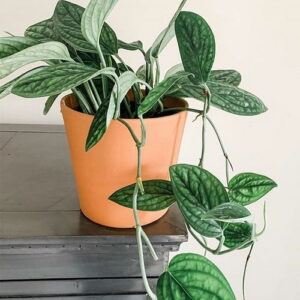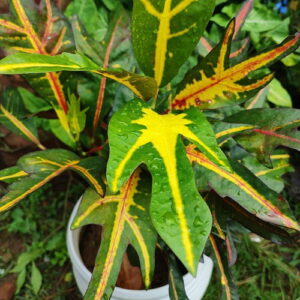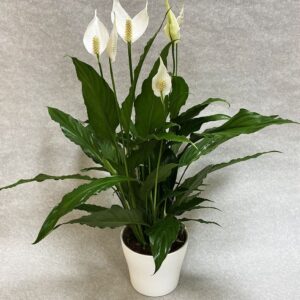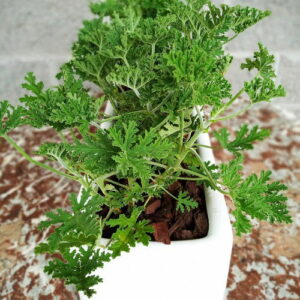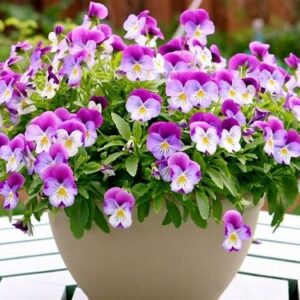1. Common Staghorn Fern

Botanical Name: Platycerium bifurcatum
The antler fronds of the Common Staghorn Fern are usually a bright, vibrant green and are shaped like the antlers of a stag, thus the name. They can grow in various directions, adding a dramatic, sculptural element to the plant.
2. Elkhorn Staghorn Fern

Botanical Name: Platycerium superbum
The antler fronds are the real showpieces of the plant, extending outward and upward in a branching pattern that resembles elk antlers.
3. Antler Staghorn Fern

Botanical Name: Platycerium alcicorne
Platycerium alcicorne has antler-like, narrow, curving fronds. Native to New Guinea and the neighboring islands, and has exceptional cultural value to the locals.
4. Giant Staghorn Fern

Botanical Name: Platycerium grande
The antler fronds can grow to an astonishing length, often exceeding 5 feet in optimal conditions. These fronds are multi-lobed and can have both broad and narrow segments, giving the plant a complex, layered appearance.
5. Slender Staghorn Fern

Botanical Name: Platycerium veitchii
Characterized by its slender and exquisitely divided fronds, this fern exudes a graceful and elegant aura. Originating from New Guinea, it is highly regarded for its delicate beauty.
6. Australian Staghorn Fern

Botanical Name: Platycerium hillii
It has two types of fronds: the “shield” and “antler”. The shield fronds are round and flat, serving as an anchor to the host surface, while the antler fronds give the plant its signature deer-antler appearance.
7. Wanda Staghorn Fern

Botanical Name: Platycerium wandae
The Heart-Shaped Staghorn Fern is a unique and captivating plant known for its distinctive frond shape resembling a heart.
8. Madagascar Staghorn Fern

Botanical Name: Platycerium madagascariense
The Madagascar variant features distinct lobed fronds resembling multiple extended fingers. These lobes radiate out from a central point, creating a truly unique visual spectacle.
9. Dutch Staghorn Fern

Botanical Name: Platycerium bifurcatum ‘Netherlands’
Like its relatives, the Dutch Staghorn Fern boasts two types of fronds: the anchoring “shield” fronds and the fertile “antler” fronds. However, its antler fronds are often more robust and deeply lobed, providing a more dramatic visual impact.
10. Crown Staghorn Fern

Botanical Name: Platycerium coronarium
What sets the Crown Staghorn Fern apart are its fertile fronds, which radiate outward in a crown-like pattern, creating a regal display. The fertile fronds often showcase lighter-colored spore patches on their undersides.
11. Miniature Staghorn Fern

Botanical Name: Platycerium ellisii
This fern presents a compact size and intricately divided fronds. Indoor gardeners often cherish its charm, allowing them to introduce elegance into more confined living areas.
12. Ridley’s Staghorn Fern

Botanical Name: Platycerium ridleyi
The shield fronds act as the anchoring base and are typically brownish-green. The antler fronds, however, are where this plant truly shines. These fronds can be extremely elongated, sometimes resembling multiple elongated fingers reaching outward.
13. Triangle Staghorn Fern

Botanical Name: Platycerium stemaria
Unlike the more common antler-like fronds seen in other Staghorn Ferns, this variety features fronds that form a near-perfect triangle. The symmetrical nature of these fronds adds a geometric aesthetic that’s both modern and natural.
14. American Staghorn Fern

Botanical Name: Platycerium andinum
Its shield fronds serve as an anchor, attaching the plant to its host or growing medium, and are generally a pale brown or tan color. The antler fronds are the show-stoppers, extending outward and resembling the antlers of a deer or elk.
15. Elephant Ear Staghorn Fern

Botanical Name: Platycerium elephantotis
What sets this fern apart is the shape and size of its antler fronds. True to its name, these fronds resemble the ears of an elephant—large, broad, and rounded. They can grow incredibly large, sometimes reaching lengths of up to 3 to 5 feet.
Quick Care Tips for Different Staghorn Fern Varieties
- Maintain moderate humidity and provide bright indirect light.
- Mist the fronds and roots 2 to 3 times a week. Ensure the shield frond is slightly moist but not soaked.
- Rotate your fern occasionally to ensure even growth on all sides.
- Trim away any dead or yellow leaves to encourage new growth.
- Be vigilant for common pests such as aphids, mealybugs, and scale insects.
- Determine your climate zone and available space, then select staghorn fern varieties accordingly.
